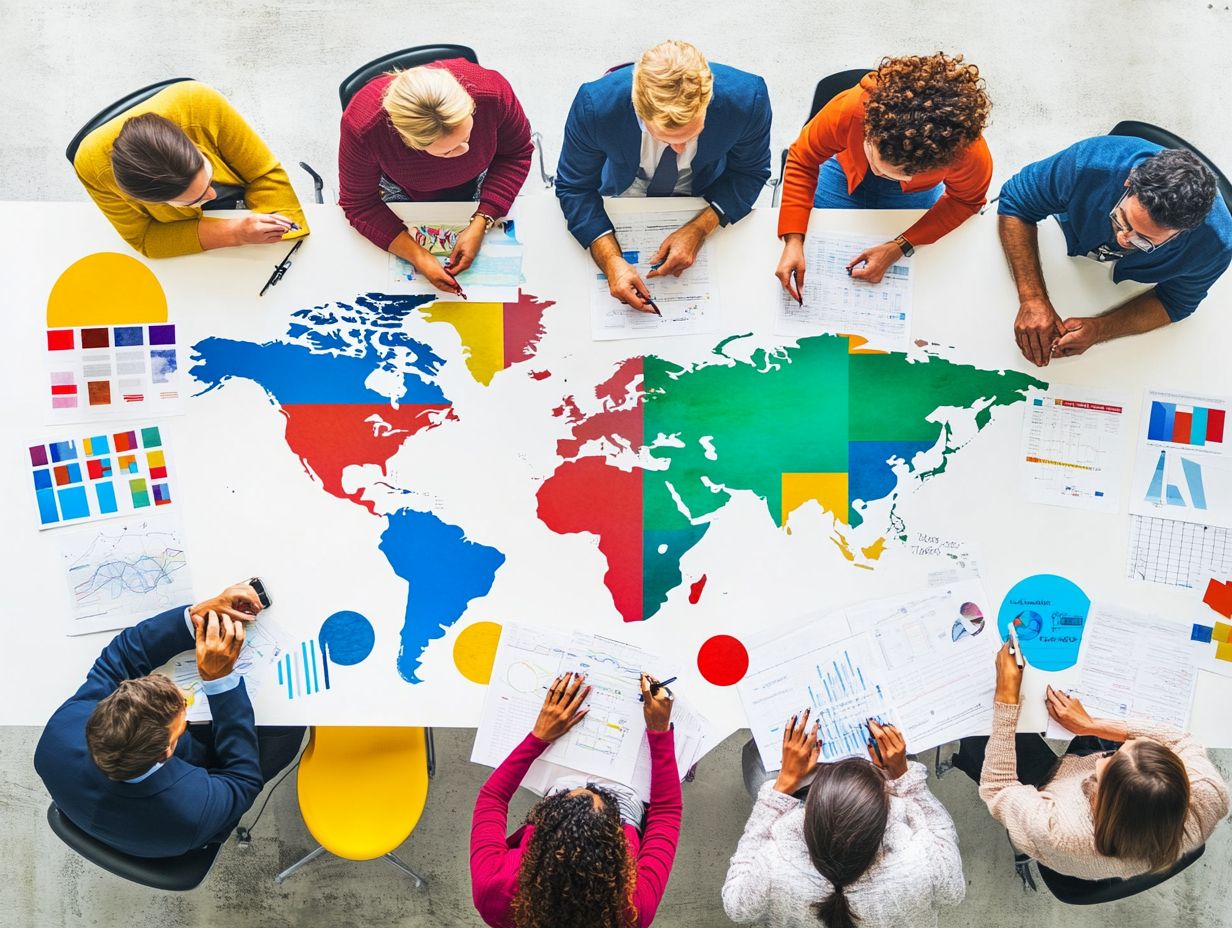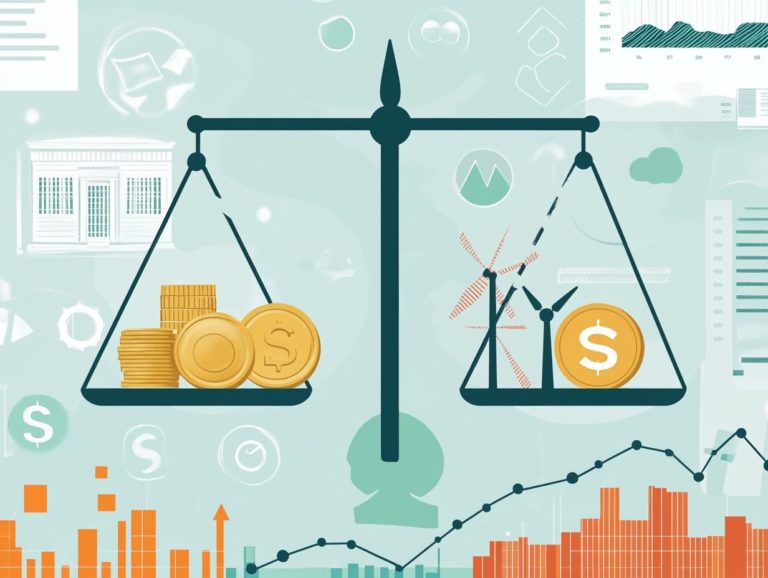Understanding the Impact of Global Events on Alternatives
In today s connected world, global events significantly influence various sectors, reshaping different options across industries.
This article delves into the intricate relationship between global occurrences and their implications for alternative solutions. You ll discover exciting risks and opportunities while crafting strategic approaches for informed decision-making, learning how to effectively manage alternatives in the face of uncertainty.
As you look ahead, you ll explore predicted emerging trends that could redefine the landscape of alternatives in response to future global events. Dive into this content to enhance your understanding and adaptability to the ever-evolving dynamics of our global environment.
Contents
- Key Takeaways:
- Defining Global Events and Alternatives
- The Connection Between Global Events and Alternatives
- Assessing the Risks and Opportunities of Alternatives During Global Events
- Strategies for Navigating Alternatives During Global Events
- Future Outlook for Alternatives in a Global Events Landscape
- Frequently Asked Questions
- What are alternatives in the context of global events?
- Why is it important to understand the impact of global events on alternatives?
- How do global events impact the availability of alternatives?
- Can global events change the viability of alternatives?
- What factors should be considered when analyzing the impact of global events on alternatives?
- How can understanding the impact of global events on alternatives contribute to better decision-making?
Key Takeaways:

Global events can significantly affect alternatives. It’s important to grasp the risks and opportunities associated with them during global events. Strategies for navigating alternatives during these times include making informed decisions and mitigating risks.
Defining Global Events and Alternatives
Global events act as powerful catalysts for change in our connected world, significantly influencing the business strategies and options available to organizations.
As globalization continues to evolve, you will observe a unique interplay between global events like the COVID-19 pandemic, climate change, and transformative social movements such as Black Lives Matter and Me Too. This interplay highlights the necessity for businesses to adapt their approaches.
Grasping these events and their implications is essential, especially as you navigate the complexities introduced by political shifts and international initiatives like Expo 2020 Dubai and the United Nations Sustainable Development Goals (SDGs).
The Connection Between Global Events and Alternatives
The connection between global events and alternatives weaves an intricate web that profoundly influences market share, business strategies, and workforce adaptation within the dynamic landscape of globalization.
Understanding this relationship is crucial as it shapes the decisions you make and the paths your organization takes in an ever-evolving world.
How Global Events Affect Alternatives
Global events wield considerable influence over the alternatives you consider, affecting your market share and driving you toward digital transformation, which means moving to online platforms, in response to evolving economic conditions.
Take the COVID-19 pandemic, for example. Many companies quickly embraced remote work technologies, which heightened their dependence on digital platforms for communication and productivity. This shift didn t just help businesses sustain operations during lockdowns; it also sparked a significant surge in e-commerce activities.
Similarly, the pressing need to tackle climate change has nudged firms toward sustainable practices, with some investing in renewable energy and eco-friendly products.
Social movements are also important, as consumers increasingly gravitate toward brands that resonate with their values. This trend prompts companies to delve into inclusive marketing strategies.
Such transformations enhance resilience against market fluctuations and redefine competitive landscapes, ultimately influencing your overall market share.
Examples of Global Events and Their Impact on Alternatives

Major global events, such as the COVID-19 pandemic, Expo 2020 Dubai, and Brexit, have reshaped the landscape of options available to businesses like yours. These events compel you to rethink your strategies in light of ongoing climate change and rising social movements.
The pandemic, for instance, has sped up the adoption of remote work technologies. This shift has prompted greater investment in digital infrastructure and more flexible work arrangements.
Brexit has also influenced many companies, possibly including yours. It has led businesses to reassess their operational locations to reduce risks associated with trade and supply chain disruptions, resulting in a thorough reevaluation of European strategies.
Social movements are gaining traction, so you might feel pressured to adopt more sustainable practices and engage actively with your communities. Brands are increasingly revising their marketing strategies to reflect values like inclusivity and environmental responsibility.
These shifts not only mirror changing consumer expectations but also highlight the critical need for your business to remain agile and responsive in an ever-evolving global landscape.
Assessing the Risks and Opportunities of Alternatives During Global Events
Assessing the risks and opportunities that alternatives present during global events is essential for you as a business leader. This helps you tackle complex challenges in an interconnected world effectively.
By understanding these dynamics, you can position your business to thrive amid uncertainty and capitalize on emerging possibilities.
Identifying Potential Risks and Benefits
Identifying potential risks and benefits is crucial as you navigate the complexities introduced by global events. This awareness allows you to adopt a flexible approach that sustains your economic impact.
Such adaptability enables a swift response to unforeseen challenges and positions you to seize emerging opportunities that may arise in changing market conditions. For example, a sudden shift in consumer behavior during a global crisis could create increased demand for specific products or services, presenting a unique growth opportunity.
By strategically assessing both the risks and benefits of these changing dynamics, you can implement innovative strategies that bolster resilience. Ultimately, leveraging insights from global developments can lay the groundwork for sustainable growth, ensuring your long-term success, even amidst uncertainty.
Developing effective strategies to navigate alternatives during global events is essential for businesses like yours that aim to make informed decisions and mitigate risks in an ever-changing landscape.
How to Make Informed Decisions and Mitigate Risks

Making informed decisions and mitigating risks requires a flexible approach that utilizes technological advancements and data-driven insights to shape your business strategies.
By using advanced analytics tools, you can assess real-time data to understand market trends and consumer behavior, especially during global events.
Integrating computer programs that learn from data enhances your predictive modeling, allowing you to better anticipate potential disruptions. This strategy will help your teams adapt quickly to any changes and challenges that arise.
Embracing cloud-based solutions also promotes collaboration across different regions, guaranteeing that all stakeholders have access to the same information.
Ultimately, these strategies create a dynamic framework that enables you to navigate uncertainty effectively, leading to more resilient operations.
Future Outlook for Alternatives in a Global Events Landscape
The future outlook for alternatives in the global events landscape is intricately shaped by evolving predictions and trends.
These shifts reflect ongoing changes in workforce adaptation and responses to the pressing challenges of climate change.
Predictions and Trends for the Future
Predictions and trends indicate an increased emphasis on digital transformation and a deeper understanding of economic impacts as businesses navigate global events.
This shift is likely to unfold in various ways, with companies embracing advanced analytics and cloud solutions to boost operational efficiency and enhance customer engagement.
As organizations face uncertainties, they’re likely to invest heavily in automation and artificial intelligence to streamline processes and cut costs.
You’ll notice a focus on developing agile supply chains capable of swiftly adapting to changing market demands while leveraging digital tools to gather real-time insights.
These strategic adaptations help mitigate financial risks and position businesses to seize emerging opportunities in an interconnected world.
Frequently Asked Questions
What are alternatives in the context of global events?

Alternatives refer to options that are available to individuals, organizations, or countries when faced with a global event or situation. These choices may vary in terms of potential outcomes, risks, and benefits, and are often considered alternatives to the status quo.
Why is it important to understand the impact of global events on alternatives?
Understanding the impact of global events on alternatives helps individuals and organizations make informed decisions. By knowing how global events can affect different options, individuals can choose the most suitable course of action to address a situation.
How do global events impact the availability of alternatives?
The impact of global events on the availability of options can vary depending on the nature of the event. In some cases, global events can limit the number of available alternatives, making it more challenging to find viable solutions. In other cases, they may create new opportunities that were not previously available.
Can global events change the viability of alternatives?
Yes, global events can change the viability of options. For example, a sudden economic downturn or political instability can render previously viable alternatives unfeasible. Conversely, a change in market trends or technological advancements may make new options more viable.
What factors should be considered when analyzing the impact of global events on alternatives?
When analyzing the impact of global events, consider the type of event, its scope and magnitude, potential consequences, and the timeframe involved. It’s also essential to account for the specific context and stakeholders involved.
How can understanding the impact of global events on alternatives contribute to better decision-making?
By understanding how global events affect alternatives, individuals and organizations can gain a comprehensive view of available options. This helps them make informed, strategic decisions that consider potential risks and opportunities associated with different choices.






